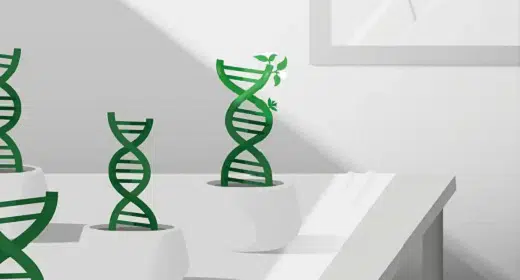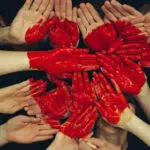by Lisa Feldman Barret: The latest science shows that genes and environment are too deeply entwined to pit them against one another…
When you hear people conversing in an unfamiliar language, why is it that you can’t even tell where one word ends and the next begins? If you are a native English speaker, why is it so challenging to get your mouth around a French or Hebrew “r”, which originates lower in the throat, or the “r” in Spanish or Italian, which is trilled on the tip of the tongue? Your ability to hear and make sounds, and to understand their meaning as language, is wired into your brain. How you acquire that wiring illuminates an age-old debate about human nature.
In the first few months of your life, your infant brain is bathed in all kinds of information from the world around you, through your senses. This sense data causes changes in your brain as your neurons fire in various patterns. Some collections of neurons fire together frequently, strengthening or tuning their connections and aiding learning. Others are used less and are pruned away, making room for more useful ones to form. This process of tuning and pruning is called plasticity, and it happens throughout your life, but enormously in the first few years.
One of the biggest sources of sense data for an infant brain is other people. As a consequence, your infant brain was tuned and pruned to detect fine differences in human speech, including a large inventory of consonant and vowel sounds, becoming expert in distinguishing one from another. But here’s the thing – babies tend to spend time with caregivers who speak the same language, so you probably missed out on many sounds found only in other languages. That’s one reason you may find it hard to produce or even discern these unfamiliar sounds today.
This brings us to the age-old debate I mentioned: are your deepest characteristics and abilities present at birth, or are they formed by your experiences in the world? In other words, is nature or nurture the prime mover? We know that part of who you are comes from genes, which contain instructions to build your body and wire your brain. We also know that the culture you grow up in can shape your brain and body in fundamental ways.
Few scientists today would say that 100% of your attributes are inborn or are learned; the debate tends to be about where to draw the dividing line. Newer evidence, however, suggests that the dividing line doesn’t really exist. Your environment, it turns out, causes certain genes to turn on and off, a process called epigenetics. You also have genes that regulate how much the environment affects you. Genes and environment are so deeply entwined, like lovers in a fiery tango, that it’s fundamentally unhelpful to call them separate names like “nature” and “nurture”.
Take the idea of sleeping on a piece of furniture called a bed, by yourself or with a partner, in a designated room called a “bedroom”, for a long chunk of time like eight hours. Such ideas are actually wired into your brain by experience and guide your expectations and actions. You can tell because it feels somehow “wrong” to change the habit. If you and your whole family all slept on straw mats in one room every night, and you had to wake up every two hours to tend the fire, it would feel unnatural to you, despite the fact that other cultures live this way.
Even emotions such as joy, sadness and fear, which feel inborn and automatic, are in fact a product of culture. Suppose you see someone make a wide-eyed, gasping face. If you grew up in a western society, you are likely to perceive fear in that face, but if you grew up in Melanesia, you’re more likely to perceive threat and aggression.
Culture allows one generation to pass information on to the next without it having to be carried by genes. Your childhood caregivers curated your physical and social world, and your brain wired itself to that world. You perpetuate that world and eventually pass your culture on to the following generation through your words and actions, wiring their brains in turn. This cultural inheritance is an efficient, flexible partner to genetic inheritance, and means that the process of evolution doesn’t require all our wiring instructions to be in genes. The way your brain becomes tuned to the languages you hear as a baby is just one example. Similarly, if you’re exposed to adversity in early life, it may activate certain genes and suppress others, wiring your brain to deal with adversity that may arise in the future. Unfortunately, this wiring also makes you more vulnerable to depression, anxiety, heart disease and diabetes in adulthood. If you have children, you might pass some of these characteristics on to them through epigenetic changes.
Cultural practices even shape the genetic evolution of our entire species, by influencing who is available to reproduce with whom, and which children are more likely to live to reproductive age. Wealth, social class, laws, war and other human inventions empower one group over another, changing the odds on whether certain people will have children together, or at all. Political and religious polarisation ensures that people with different beliefs will scarcely speak to one another, let alone date or mate. Parents who vaccinate their children against deadly diseases, or choose not to, likewise make waves in the gene pool. This is how humans, by virtue of the cultures we create, nudge the evolutionary trajectory of our species.
Culture is not a mere moderator of our biology, then, but a fully fledged cause. I’m not saying that your culture determines your destiny, but then neither do your genes. Together, your genes and the world you live in make you who you are (for better or for worse). We are therefore all partly responsible for wiring each other’s brains, and the brains of the next generation, through our words and actions. That’s the lesson of the latest science: there need be no “versus” in the equation. We simply have the kind of nature that requires nurture, and they are utterly intertwined.
















































